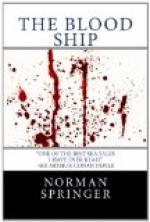Often he had trouble getting stiffs. In some ports, where the crimping system was not developed, the hell ship waited for months for a crew. In other ports, like San Francisco, where the boarding master’s will was the law of sailortown, the captain paid over his blood money, and the boarding master delivered him his crew, drunk, drugged and sandbagged. When he got to sea he would find his crew composed chiefly of the very scum of the waterside, a mode of unlicked, lawless ruffians, and his bucko mates would need all their prowess to keep them subordinate. Hazing such a mob was the only way to manage them. Also, it made them run away and leave their wages behind.
But there were degrees of “heat” in the hell-ships. The bucko mates usually contented themselves with working the men at top speed, depriving them of their afternoon watches below, and thumping the stiffs, because they were lubberly at their work. This treatment was sufficiently severe to produce the desired results. This was normal hell-ship style. The few sailors, in the crew, providing they were willing, rarely received more than verbal abuse.
Now, brutality feeds upon itself. Some officers, after living under the system for a time, became perfect fiends. They came to enjoy beating up men. In some ships, the dressing down of the crew was a continuous performance, and sailors, as well as stiffs, caught it.
As in the Golden Bough. God’s truth, there was blood spilt every watch! Always, after the first day out, did the foc’sle bunks contain a miserable wretch or two laid up because of a manhandling.
Yet we of the starboard watch were comparatively lucky. Mister Lynch, our officer, was what I may call a normal bucko. He hazed for the results rather than for the pleasure of hazing, though I think he did get some satisfaction out of thumping the men. You feel a fine thrill when you see a half dozen huskies cringe away before you with fear in their eyes. I imagine it is the same thrill a wild animal tamer feels as he faces his beasts. I felt this fascinating sensation many times after I had become a mate of ships. Lynch had no mercy on the stiffs of our watch; he hammered the rudiments of seamanship into them with astonishing speed. He cuffed a knowledge of English into the squareheads. But he kept his hands off Newman and me, not because he was afraid of us—I don’t think Lynch feared anything—but because we knew our work and did it. Oh, I got mine, and with interest, in the Golden Bough, but not from Lynch.
The mate was a different type. He was all brute, was Fitzgibbon, and sailors and stiffs alike caught it from him. A natural bully, and, like most such, at heart craven.
Lynch used his bare fists upon the men, Fitz used brass knuckles. I don’t think Lynch ever bothered to carry a gun in the daytime. Fitzgibbon never stirred on deck without a deadly bulge in his coat pocket. Lynch stalked among us by night or day, alone, and unafraid. After dark, the mate never stirred from the poop unless Sails and Chips were at his heels. Lynch was a bluff, hard man; Fitzgibbon was a cruel, sly beast.




